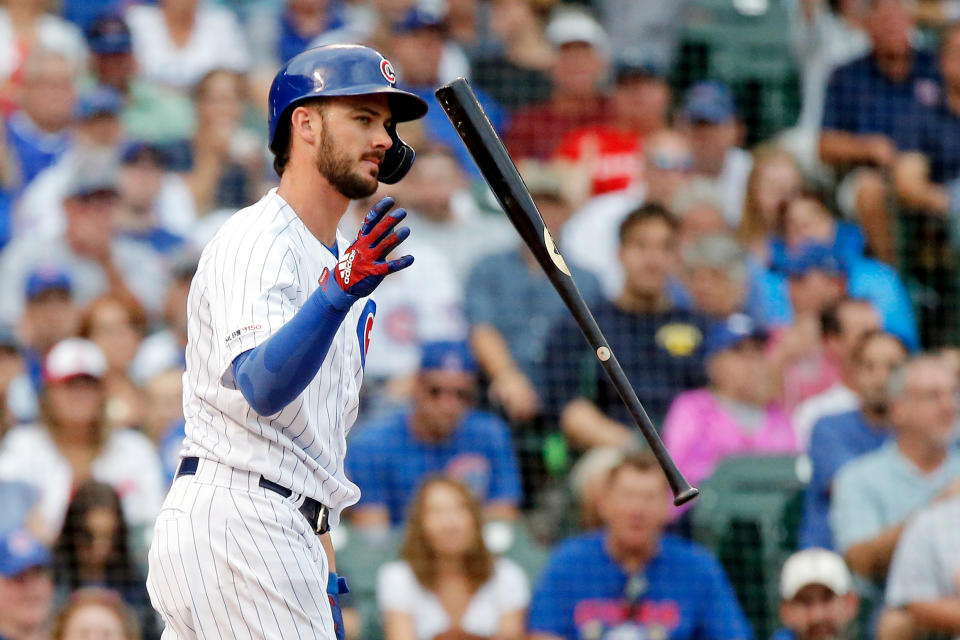Kris Bryant lost his free-agency grievance, but his fight proves MLB players deserve every dollar they get
The next time you question whether Major League Baseball players make too much money for playing a kids’ game, do all of us a favor.
Stop and think about Kris Bryant.
The ongoing saga about the Cubs’ alleged free-agency manipulation of Bryant — a case the former NL MVP has lost, we learned Wednesday — should prove this very point forever and ever: Baseball players should try to get every penny they can from team ownership because teams will try to squeeze everything they can out of players.
Even the best ones. Even the face-of-the-franchise future stars.
And now we’re left with another example of why more baseball players could be ready for a work stoppage when the current collective-bargaining agreement expires after the 2021 season. And why baseball’s economic model might need a huge overhaul.
The decision in the Bryant case isn’t shocking. Not many expected him to win, as ESPN’s Jeff Passan reported. Bryant was trying to prove the Cubs had manipulated his service time to keep him under contract for another year. It was a losing battle, but an honorable one.
Here’s the way all this works: MLB players collect a year of service time upon spending 172 days in the big leagues. Six years of service time and they can become a free agent. The Cubs called up Bryant in 2015 at a time where he could only accumulate 171 days in the big leagues.
He started the year in the minors to “work on his defense” as the Cubs put it. Of course, he was the top prospect in baseball at the time and had hit 43 homers and knocked in 110 runs with a 1.098 OPS the year prior in the minors. Defense, schmefense.

This isn’t a new hustle by MLB teams. It’s been going on for years. Bryant just took the unusual step to file a grievance against the Cubs for it. Had he won, he’d be a free agent after the 2020 season. Instead, he’ll be a free agent after 2021.
Everybody knows what the Cubs did, yet there’s no way to prove it and, thus, no way for Bryant to win his case. It shows just how little power the players actually have compared to MLB front offices and ownership.
Bryant has done just fine for himself, so this isn’t about him crying poor. He won the Rookie of the Year, an MVP and helped the Cubs break the most famous championship drought in sports and was compensated nicely during the arbitration process. But this power dynamic doesn’t just affect MLB’s stars.
The entire system seems broken — this case reminds us, and so does Kyler Murray’s decision to ditch baseball and join the NFL.
It all starts with the notion that minor leaguers are paid a wage that’s under the poverty line. If they perform well — like Bryant did — and zoom through the minor leagues, there’s some relief in sight when they’re on a big-league roster. But even then they’re not guaranteed a payday on the open market until after six years of service time.
How many players even make it that deep into their career?
The entire economy of baseball is set up to suppress wages until a player becomes a star and hits free agency, which is when they can really cash in. And even then, as the Kris Bryant saga proves, teams have tricks up their sleeves to pre-emptively delay that.
This is why players are starting to stand up and speak out. This is why the next collective-bargaining agreement could be a fight. This is why the entire economic model may need to be overhauled.
Players like Kris Bryant realize the power structure isn’t in their favor. Yet MLB became a $10 billion business that includes things like streaming deals and stadium naming rights that are built on the backs of players.
So if players have the opportunity, after all that time, to get the $300 million contract or even the $100 million contract, then more power to them. Fans shouldn’t disparage them as being “overpaid.”
Fact is, after years of being a commodity on a spreadsheet, free agency is when they’re finally able to get their piece of the pie.
And that — as Kris Bryant showed, win or lose — is worth fighting for.
More from Yahoo Sports:

 Yahoo Finance
Yahoo Finance 